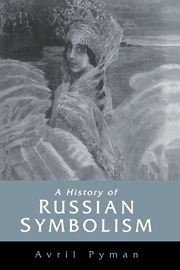Book contents
- Frontmatter
- Contents
- Preface
- Acknowledgements
- Note on the text and list of abbreviations
- Prologue: decadence or rebirth? The European fin de siècle and the Russian precursors
- Part 1 The art of the cell
- Part 2 Collective creation
- Part 3 Gleams of paradise
- 7 The turn of the century. The early poetry of the second generation of Russian Symbolists: Viacheslav Ivanov, Bely, Blok (1900–4)
- 8 The Sophia-myth and the theme of Apocalypse. The influence of Solov′ev and Nietzsche (1892 onwards)
- Part 4 A glittering hell
- Part 5 Our home from the beginning
- Epilogue
- Chronology
- Notes
- Bibliography
- Index
7 - The turn of the century. The early poetry of the second generation of Russian Symbolists: Viacheslav Ivanov, Bely, Blok (1900–4)
Published online by Cambridge University Press: 08 January 2010
- Frontmatter
- Contents
- Preface
- Acknowledgements
- Note on the text and list of abbreviations
- Prologue: decadence or rebirth? The European fin de siècle and the Russian precursors
- Part 1 The art of the cell
- Part 2 Collective creation
- Part 3 Gleams of paradise
- 7 The turn of the century. The early poetry of the second generation of Russian Symbolists: Viacheslav Ivanov, Bely, Blok (1900–4)
- 8 The Sophia-myth and the theme of Apocalypse. The influence of Solov′ev and Nietzsche (1892 onwards)
- Part 4 A glittering hell
- Part 5 Our home from the beginning
- Epilogue
- Chronology
- Notes
- Bibliography
- Index
Summary
А в последних днях улетающего столетия я написал последнюю фразу Северной Симфонии, повернутой к новому веку: ‘Ударил серебрянный колокол’. Для одних щелкала пробка шампанского как в прошлом; другие слышали удар колокола; и гадали, о чем удар …
Андрей БелыйThere was a distinct change of atmosphere at the turn of the century and the writers who appeared on the literary scene at that time, the so-called ‘second generation’ of Russian Symbolists, were distinctly different. No longer voices crying in the wilderness, they came with a message – or a hope, or a warning – and they came with a rush. Where the forerunners had fought their way inch by inch, the breach they had made in public acceptance was suddenly filled by an exuberant brotherhood consecrated to change – not only in literature, but in culture, in life itself.
These newcomers had grown up, like the first generation, in the stuffy confinement of a complacent age, but windows had been opened, rays of light and drafts of air admitted, escapes prepared. There was an exciting period of conspiracy, skirmishes and battle – during which an exceptional solidarity and sympathy grew up among the rebels, a commitment to the common cause only equalled by the weighty inertia of the opposition.
This solidarity was of a different pattern from the usual friendships within literary movements. The Pushkin pléiade, for instance, drank and laughed together, exchanged charming letters in verse and prose, mourned their exiled and executed friends, loved one another, even; but all in the awareness that – however severe and stupid their rulers might be – they themselves were the flower of an expanding, growing society.
- Type
- Chapter
- Information
- A History of Russian Symbolism , pp. 183 - 225Publisher: Cambridge University PressPrint publication year: 1994



